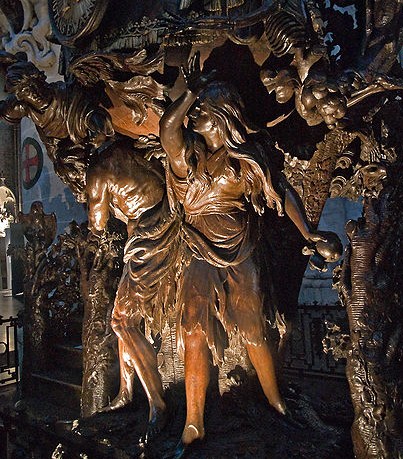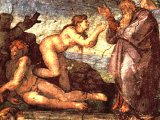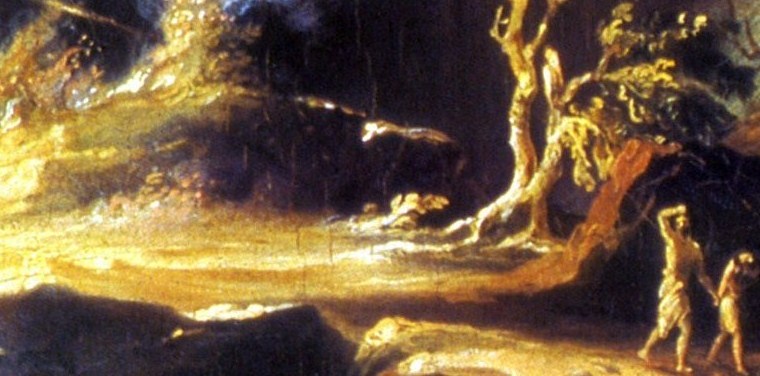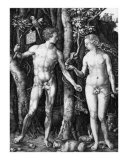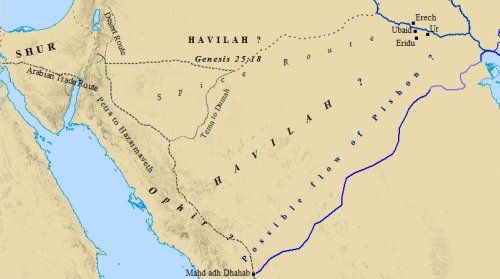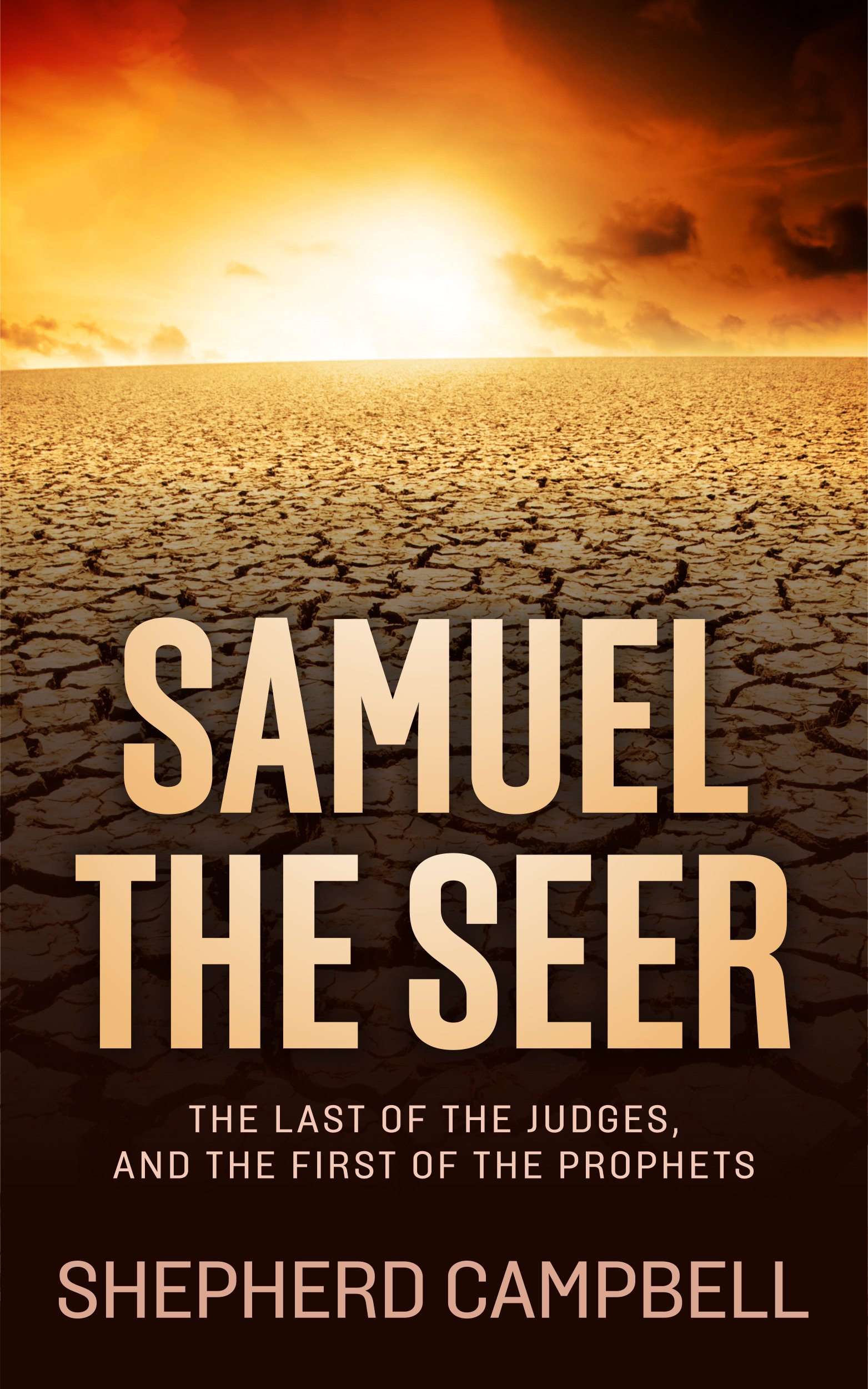- Biblical Maps
- Home Page
- History of Israel Blog
- Ancient Mesopotamia
- Map of Palestine
- Abraham
- Ancient Israel
- 12 Tribes of Israel
- Jerusalem
- The Book of Isaiah
- Palestine
- The Habiru
- Contact Us
- Bible Study Forums
- Media Page
- Visitors Sitemap
- Privacy Policy
- The History of the Old Testament
- In the Days of Noah
- The City of Jericho
VISIT OUR FACEBOOK PAGE!
The Life of Adam and Eve
The life of Adam and Eve reaches a turning point in Genesis 2:18. Up to this point in Creation Adam had lived in Eden alone, or at least with the company of the animals God had created to live with him. God had sought a suitable helper for Adam, but was unable to find
one amongst the animals. Thus God created another life similar in shape and nature to that of Adam in Genesis 2:18.
"And the Lord God said, 'It is not good that the man should be alone; I will make him a help meet for him" (KJV)
Most versions translate "helper" as "mate" or "companion", etc. The
phrase literally translates, "a helper like man". The nature of this phrase has led to hundreds of interpretations as to its exact meaning.
God had created Adam first. Then God created the animals for him to have dominion over. Each animal was created in pairs of two. The human, however, had not been created in a pair. He was alone, and none of the animals were found suitable for Adam because animals are not like man. Thus, God created an Adam-like, or man-like life form by creating that life out of Adam/man. Adam and Eve were to be connected in a most profound way.
Genesis 2:21-22
"And the Lord God caused a deep sleep to fall upon Adam, and he slept; and he took one of his ribs, and closed up the flesh instead thereof. And the rib, which the Lord God had taken from man, made he a woman, and brought her unto the man."
The word translated "rib" is a poor translation. Out of the 35 times tsela appears in the Old Testament, this is the only time it is translated as "rib". Most of the time this word is translated as "side", and indicates companionship and equality. The life of Adam and Eve was to be one of equality and harmony with no side exercising dominion over the other.
Hence the command in Genesis 2:24, which
explicitly states that a man and a woman shall leave their home and
become one. This is the very first commandment having to do with the
institution of marriage and it is a commandment for monogamous marriage between a man and a woman. Yet throughout the Old Testament various characters are portrayed with multiple wives - most notably King Solomon (he had 700 wives). God's people did not always follow God's commands. It's been a theme of mankind since creation!
The word "woman" is the Hebrew isha, because it was out of man, ish,
that she was made. The two were naked at this point in the narrative, unaware of their condition and without shame. To them this was their natural state. Innocence was still maintained as sin had not yet slithered into the Garden.
Adam and Eve were God's original intention, unflawed, perfect in innocence with no concept of vulnerability, evil, shame, etc. They were given instructions to be fruitful and multiply. It is believed by old Jewish traditions Adam and Eve had 56 children. Adam had 33 sons and 23 daughters. It was from this offspring the ancient world would spring forth, and Eve truly would become the mother of all that lives. The life of Adam and Eve was a life of abundance and paradise.
The Life of Adam and Eve After the Fall
The blissful story of Paradise was about to take a tragic turn, throwing a massive wrench into the life of Adam and Eve. Genesis 2:17 records God's first command to Adam. It should be noted the command was given before Eve had been created. Adam alone was the original recipient of God's instruction concerning the trees and fruit of the Garden of Eden.
"but you must not eat of the fruit of the Tree of the Knowledge of Good and Evil, for when you eat of it you will surely die.".
It is important to emphasize the fact Adam was alone when God instructed him. Consequently, it was up to Adam to transmit the instructions to Eve, and to emphasize the necessity of staying away from these trees and fruit. Perhaps God mentioned it to Eve as well after her creation, yet if so the Bible is silent on the matter. Thus we must assume it was left to Adam to transmit God's instructions to Eve.
When God told Adam that they would die, His intention was
not that they would die immediately after eating the fruit - though this is what the crafty serpent led Eve to believe. If this
were God's intention, then nobody would be left to populate the earth. Based on God's character He foresaw the Fall, thus foresaw the necessary punishment to get across His message while still furthering His purpose.
God meant, instead, that they would die a slow death over time. The life of Adam and Eve would not end instantly, but over time. They would lose either eternal life or extreme longevity - whichever of the two was God's original intent. With death came decay, suffering, pain, and loss - all of which were unfamiliar to Adam and Eve. These concepts were not in God's original plan - thus had not been experienced by the man and woman. The serpent, however, shows his cleverness and twists this consequence to imply God meant they would die immediately upon eating the fruit.
Genesis 3 introduces the crafty linquist/serpent into the story of Adam and Eve.
"Now the serpent was more crafty than any beast of the field which the Lord God had made. And he said to the woman, ' Indeed, has God said, You shall not eat from any tree of the garden? "
The serpent immediately attempts to confuse Eve with a knowingly incorrect question. The snake knew what God had said to Adam. The controversial Ziony Levitt states the serpent was likely with Adam in the Garden before Eve - and had heard the original command issued by God to Adam.
However, the serpent wishes to discredit God through hint and deception by any way possible. As Eve was not present at the original command, she was the easiest target to confuse. The question the serpent asks Eve has a tone which suggests an unreasonable God.
Eve pursues her curiosity by answering the serpent. In all likelihood she knew, or at least suspected, the serpent had an agenda. Anything other than obedience to God was forbidden in the Garden - both her and Adam knew such without doubt. Perhaps Eve truly possessed an innocent naivety in her response. Whatever her motive, she opened the door for Satan's attack by appeasing her curiosity, thus forever altering not only their lives, but the whole of mankind as well.
Genesis 3:2-3
"And the woman said to the serpent, 'From the fruit of the trees of the garden we may eat; but from the fruit of the tree which is in the middle of the garden, God has said, 'You shall not eat from it or touch it, lest you die.' "
The serpent feigns disbelief, casting further doubt on such an unreasonable edict by exclaiming; "You surely shall not die!" (Gen. 3:4). Eve succumbs to this rationale and tests the logic of the serpent.
Once She tastes from the tree and lives, then naturally the next step is to approach Adam. It is a reasonable assumption that Eve justified her actions to Adam by using the same logic the serpent had used on her. She twisted God's original words to suggest He was mistaken. She ate the fruit and was still alive, thus it was not as God had said it would be. Adam and Eve had crossed a line from which they could never return.
If Adam put up a fight then scripture does not mention it. In fact, the passage gives the impression that Adam went along quite easily and willfully. If this is true, and he was the original recipient of the command, then the question must be raised as to who has more guilt - Adam, or Eve? Eve has caught the brunt of the blame over the millennia, yet Adam was the original recipient of God's order. He knew exactly what God had said and intended. He simply chose to follow the woman over his God.
In his guilt, when questioned by God in verse 12, Adam places the blame on God for putting Eve in the garden, implying she is a temptation to him. The age-old blame game was born. Of course it was not Adam's fault, and not even Eve's, but it was God's fault for even making Eve!
Whoever the blame lie with quickly became irrelevant as sin was introduced into the world - instantly changing the nature of everything. Immediately upon Adam and Eve's disobedience, their eyes became open and they noticed each others' nakedness. They became ashamed and embarrassed. The nature of their relationship had changed. Adam and Eve then sew leaves together to cover themselves. The life of Adam and Eve had been corrupted by shame and deception - two emotions never before experienced in the Garden of Eden.
When they heard God "walking in the garden, in the cool of the day" (Gen. 3:9), they ran and hid - like a couple of guilty children. God immediately confronts them by asking why they would run and hide. When Adam answers because they were naked, thinking he could throw God off of their trail, God naturally asks the follow up question in Genesis 3:11;
"Who told you that you were naked? Have you eaten from the tree that I commanded you not to eat from?"
The two now possessed knowledge of a condition they previously
were unaware of. Their knowledge was a product of their disobedience. These two factors, according to God, would not permit man to live forever. God knew
the heart of man would strive for more and more, thus their time on earth must be limited. From this moment on the lifespan of humans began to decline.
ADAM & EVE WERE CAST FROM EDEN BY GOD. A FLAMING CHERUBIM WAS PLACED AT THE ENTRANCE OF THE GARDEN TO PREVENT MAN FROM REENTERING
Death became the inevitability of the human condition. From the moment man was born, man began to die. The life of Adam and Eve in the biblical Garden of Eden was over. God cast them from the Garden in the closing verse of chapter 3.
"So He drove the man out; and at the east of the garden of Eden He stationed the cherubim, and the flaming sword which turned every direction, to guard the way to the tree of life."
Seth's Line (seed of the woman - Genesis 3:15)
The life of Adam and Eve, though cast from the Garden in shame, found delight in their newborn son, Seth. In God's perfect creation, the history of Israel could have been traced down to Able , for he was the righteous seed of Adam. God had separated the seed of the serpent from the blessed "seed of the woman" in Genesis 3. Able was supposed to have transmitted God's message to further generations as the first-born son. It was through him, the blessed seed of the woman Eve, that God had planned to establish the nation of Israel and establish His kingdom on earth.
Instead, the life of Adam and Eve found new purpose in the line of
Seth. God, as always, was not deterred by Satan's efforts to disrupt His ultimate plans. The promised "seed of the woman" that Satan had tried to
crush with Cain, was reestablished through the line of Seth. It was through the children of Eve (seed of the woman) that God would ultimately bring about His kingdom. As the adversary, Satan wishes to prevent such a kingdom - for the earth is currently at his disposal. This struggle for dominion and victory began in heaven, and continues on earth with the children of Adam and Eve.
When Adam was 130 years old God gave him and Eve another son which they named Seth. Seth means "appointed, substituted". Ancient Israel was to be carried through the line of Seth, a substitue for the murdered Able. A significantly different tone is taken with Seth's line than with Cain's. Seth gives birth to a son and calls him E'nos.
The name E'nos means "mortal frailty", and perhaps Seth had realized the weakness of man to resist evil, and the ever dependence upon God to live a life of righteousness. Seth and E'nos were very Godly men and carried God's message into the next generations.
Genesis 4:26 tells us that it was in the time of E'nos that men began to call upon the name of the Lord. In stark contrast to the boasting and building of Cain's descendants, through Seth's line man began calling upon the name of the Lord. It is likely this phrase hints that for the first time man was meeting in public worship of the Lord, as opposed to the previous individual worship structure, perhaps originally family affairs.
The story of Eden, and indeed the first five chapters of Genesis, is one of a family history. The life of Adam and Eve represent the first life of a man and woman together - united by Yahweh. The Old Testament began with the family of Adam and Eve - and these lineages are the records of God's first family. This lineage would ultimately lead to Abraham, Isaac and Jacob.
It was through Seth, the substitution for Abel, that produced E'nos, who brought forth Cainan, who brought forth Mahalaleel, who brought forth Jared, who brought forth Enoch , who "walked with God, and was not, for God took him." (Gen. 5:24)
Enoch brought forth Methuselah, the oldest man in the Bible at 969 years of age before death. Methuselah brought forth Lamech, the father of Noah. The righteousness of God was preserved through the Sethitic Line due in part to the extremely long life spans of the pre-flood Patriarchs.
Adam lived until Noah's father Lamech was 56 years old. Seth had only been dead 14 years when Noah was born. It was through Noah's line that God would preserve mankind after the Flood.
The long life of Adam and Eve had lasted hundreds of years - nearly a millennia. Lamech and Adam may have even spent some time together.
Noah is the link between the ancient world before the Genesis flood, and the world as we know today, as handed down by the history of Israel recorded in the Biblical book of Genesis. The Flood exists as the centerpiece of antiquity - described by countless different myths, religions and cultures from all corners of the world. Each has its own Noah, perhaps the most notable is Ziusudra the Sumerian version.
Noah no doubt spent countless hours listening to his father relate the stories of Adam, Abel and Cain, Seth, and the other patriarchs of Jewish history. He must have heard about the rebellion of Cain, and the other "side" of the family. Noah knew it was through Seth the family line was carried up to him.
Noah was the link which would transmit YHWH's commands from the Old World of antiquity to the next generation. Due to the annihilation of the Old World by the Flood, the next generation was the first generation in the New World.
HAVILAH
The region of Havilah has an interesting place in the Bible. Genesis 10:7 lists one of Cush's son's name as Havilah, as well as a son of Joktan in Genesis 10:29. Cush was a descendant of Ham, and Joktan of Shem .
Havilah is believed to translate literally as 'Sandland'. It possessed an abundance of gold and precious stones and substances.
The exact nature of the "onyx stone" present in Havilah is not known, but apparently it was quite valuable. Bdellium, a precious gum, was also found in Havilah. This substance has been likened by some scholars to the "manna" found in Numbers 11:7. Bdellium is a thick, black, viscous substance closely related to petroleum, oil, and tar based substances. This substance was found abundantly in the region of Sodom and Gomorrah . This was a waterproofing agent as well. It was used to line the basket of the infant Moses.
Adam and Eve may have spent time exploring this rich and extravagant land. Havilah had made quite an impression on the descendants of Adam.
Share Your Thoughts on Life in Eden.
What is your opinion of the Genesis story of Eden? Do you think Eden has been found? Click on the above link to give us your insight, thoughts, comments, and questions!
Back to the Top
Back to Ancient Israel
Back to Home Page
Share Your Thoughts on Ancient Israel
Are you a student of Israel? Do you love history? Do you live in Israel? Have you been to the Holy Land? Share your thoughts and experiences regarding Israel here!
What Others Have Said
Click below to see contributions from other visitors to this page...
I am Retired Egyptian Engineer,and love so much the common history between Egypt and Israel 




Generally speaking,Jewish are our brothers,and live with us since a long time...we never forget the prophet Yousef (Josef)who saved Egypt from starvation...in …
The BIBLICAL land of Eden and Garden... 




Please review my article that gives the BIBLICAL REFERENCES to the location of the land of Eden, on a map that reveals the "Land of Eden" encompasses the …
Adam & Eve in the Koran Not rated yet
About the creation of Adam and Eve, in our Koran the story is quite different to what i have just finish reading. It is said that God had collected his …
SAMUEL the SEER
Now Available in Print & eBook on Amazon!!
POPULAR TOPICS
Learn more about these popular topics below. The Bible is full of fascinating stories, characters and mysteries!
BIBLE MAPS
Explore the land of the Old Testament! View these maps of the Bible.
